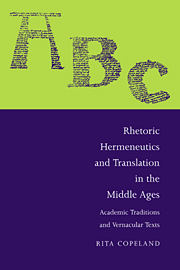Book contents
- Frontmatter
- Contents
- Acknowledgments
- List of abbreviations
- Introduction
- 1 Roman theories of translation: the fusion of grammar and rhetoric
- 2 From antiquity to the Middle Ages I: the place of translation and the value of hermeneutics
- 3 The rhetorical character of academic commentary
- 4 Translation and interlingual commentary: Notker of St. Gall and the Ovide moralisé
- 5 Translation and intralingual reception: French and English traditions of Boethius' Consolatio
- 6 From antiquity to the Middle Ages II: rhetorical invention as hermeneutical performance
- 7 Translation as rhetorical invention: Chaucer and Gower
- Afterword
- Notes
- Bibliography
- 1 Index of names and titles
- 2 General index
6 - From antiquity to the Middle Ages II: rhetorical invention as hermeneutical performance
Published online by Cambridge University Press: 03 December 2009
- Frontmatter
- Contents
- Acknowledgments
- List of abbreviations
- Introduction
- 1 Roman theories of translation: the fusion of grammar and rhetoric
- 2 From antiquity to the Middle Ages I: the place of translation and the value of hermeneutics
- 3 The rhetorical character of academic commentary
- 4 Translation and interlingual commentary: Notker of St. Gall and the Ovide moralisé
- 5 Translation and intralingual reception: French and English traditions of Boethius' Consolatio
- 6 From antiquity to the Middle Ages II: rhetorical invention as hermeneutical performance
- 7 Translation as rhetorical invention: Chaucer and Gower
- Afterword
- Notes
- Bibliography
- 1 Index of names and titles
- 2 General index
Summary
So far this book has emphasized the status and condition of exegesis, its relationship with rhetoric, and its role within vernacular translation. Now it is necessary to reverse that emphasis and to consider the fortunes of rhetoric, and specifically the role of rhetorical inventio in vernacular translation. The translations that I have discussed so far, Notker's translation of Martianus Capella, the Ovide moralisé, and the Old French and Middle English versions of the Consolatio, define themselves in terms of exegetical practice. In the final chapter I will consider translations that offer themselves as forms of rhetorical invention. In order to understand this latter form of translation we must first take account of how the value of invention changes from the context of classical oratory to that of medieval poetics. My interest in this chapter will be to retrace the history of the relationship between rhetoric and hermeneutics, but this time directing my focus to how this relationship defines the meaning of rhetorical inventio for the later Middle Ages.
INVENTION IN ANTIQUITY
In ancient rhetoric, invention is the discovery of a plausible and persuasive argument through a system of proofs. Inventio (Greek heuresis) literally means a “coming upon,” a discovery of that which is there, or already there, to be discovered. The term has little to do with originality or with creation ex nihilo. In all of its theoretical avatars among the ancients, invention is what Roland Barthes has aptly termed an “extractive” operation.
- Type
- Chapter
- Information
- Rhetoric, Hermeneutics, and Translation in the Middle AgesAcademic Traditions and Vernacular Texts, pp. 151 - 178Publisher: Cambridge University PressPrint publication year: 1991
- 1
- Cited by



